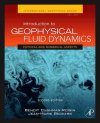![Introduction to Geophysical Fluid Dynamics Introduction to Geophysical Fluid Dynamics]()
Click to have a closer look
About this book
Contents
Customer reviews
Related titles
About this book
This book provides an introductory-level exploration of geophysical fluid dynamics (GFD), the principles governing air and water flows on large terrestrial scales. Physical principles are illustrated with the aid of the simplest existing models, and the computer methods are shown in juxtaposition with the equations to which they apply. It explores contemporary topics of climate dynamics and equatorial dynamics including the Greenhouse Effect, global warming, and the El Nino Southern Oscillation.
Contents
Foreword
Preface
Preface of the first edition
I Fundamentals
1 Introduction
1.1 Objective
1.2 Importance of geophysical fluid dynamics
1.3 Distinguishing attributes of geophysical flows
1.4 Scales of motions
1.5 Importance of rotation
1.6 Importance of stratification
1.7 Distinction between the atmosphere and oceans
1.8 Data acquisition
1.9 The emergence of numerical simulations
1.10 Scales analysis and finite differences
1.11 Higher-order methods
1.12 Aliasing
Analytical Problems
Numerical Exercises
Walsh Cottage, Woods Hole, Massachusetts
UK Meteorological Office, Exeter, England
2 The Coriolis Force
2.1 Rotating framework of reference
2.2 Unimportance of the centrifugal force
2.3 Free motion on a rotating plane
2.4 Analogy and physical interpretation
2.5 Acceleration on a three-dimensional rotating planet
2.6 Numerical approach to oscillatory motions
2.7 Numerical convergence and stability
2.8 Predictor-corrector methods
2.9 Higher-order schemes
Analytical Problems
Numerical Exercises
Biography: Pierre Simon Marquis de Laplace
Biography: Gaspard Gustave de Coriolis
3 Equations of Fluid Motion
3.1 Mass budget
3.2 Momentum budget
3.3 Equation of state
3.4 Energy budget
3.5 Salt and moisture budgets
3.6 Summary of governing equations
3.7 Boussinesq approximation
3.8 Flux formulation and conservative form
3.9 Finite-volume discretization
Analytical Problems
Numerical Exercises
Biography: Joseph Valentin Boussinesq
Biography: Vilhelm Bjerknes
4 Equations Governing Geophysical Flows
4.1 Reynolds-averaged equations
4.2 Eddy coefficients
4.3 Scales of motion
4.4 Recapitulation of equations governing geophysical flows
4.5 Important dimensionless numbers
4.6 Boundary conditions
4.7 Numerical implementation of boundary conditions
4.8 Accuracy and errors
Analytical Problems
Numerical Exercises
Biography: Osborne Reynolds
Biography: Carl-Gustaf Arvid Rossby
5 Diffusive Processes
5.1 Isotropic, homogeneous turbulence
5.2 Turbulent diffusion
5.3 One-dimensional numerical scheme
5.4 Numerical stability analysis
5.5 Other one-dimensional schemes
5.6 Multi-dimensional numerical schemes
Analytical Problems
Numerical Exercises
Biography: Andrey Nikolaevich Kolmogorov
Biography: John von Neumann
6 Transport and Fate
6.1 Combination of advection and diffusion
6.2 Relative importance of advection: The Peclet number
6.3 Highly advective situations
6.4 Centered and upwind advection schemes
6.5 Advection-diffusion with sources and sinks
6.6 Multi-dimensional approach
Analytical Problems
Numerical Exercises
Biography: Richard Courant
Biography: Peter Lax
II Rotation Effects
7 Geostrophic Flows and Vorticity Dynamics
7.1 Homogeneous geostrophic flows
7.2 Homogeneous geostrophic flows over an irregular bottom
7.3 Non-geostrophic flows
7.4 Vorticity dynamics
7.5 Rigid-lid approximation
7.6 Numerical solution of the rigid-lid pressure equation
7.7 Numerical solution of the streamfunction equation
7.8 Laplacian inversion
Analytical Problems
Numerical Exercises
Biography: Geoffrey Ingram Taylor
Biography: James Cyrus McWilliams
8 Ekman layer
8.1 Shear turbulence
8.2 Friction and rotation
8.3 The bottom Ekman layer
8.4 Generalization to non-uniform currents
8.5 The Ekman layer over uneven terrain
8.6 The surface Ekman layer
8.7 The Ekman layer in real geophysical flows
8.8 Numerical simulation of shallow flows
Analytical Problems
Numerical Exercises
Biography: VagnWalfrid Ekman
Biography: Ludwig Prandtl
9 BarotropicWaves
9.1 Linear wave dynamics
9.2 The Kelvin wave
9.3 Inertia-gravity waves (Poincaré waves)
9.4 Planetary waves (Rossby waves)
9.5 Topographic waves
9.6 Analogy between planetary and topographic waves
9.7 Arakawa’s grids
9.8 Numerical simulation of tides and storm surges
Analytical Problems
Numerical Exercises
Biography: William Thomson, Lord Kelvin
Biography: Akio Arakawa
10 Barotropic Instability
10.1 Mechanism
10.2 Waves on a shear flow
10.3 Bounds on wave speeds and growth rates
10.4 A simple example
10.5 Nonlinearities
10.6 Filtering
10.7 Contour dynamics
Analytical Problems
Numerical Exercises
Biography: Louis Norberg Howard
Biography: Norman J. Zabusky
III Stratification Effects
11 Stratification
11.1 Introduction
11.2 Static stability
11.3 A note on atmospheric stratification
11.4 Convective adjustment
11.5 The importance of stratification: The Froude number
11.6 Combination of rotation and stratification
Analytical Problems
Numerical Exercises
Biography: David Brunt
Biography: Vilho Väisälä
12 Layered Models
12.1 From depth to density
12.2 Layered models
12.3 Potential vorticity
12.4 Two-layer models
12.5 Wind-induced seiches in lakes
12.6 Energy conservation
12.7 Numerical layered models
12.8 Lagrangian approach
Analytical Problems
Numerical Exercises
Biography: Raymond Braislin Montgomery
Biography: James Joseph O’Brien
13 Internal Waves
13.1 From surface to internal waves
13.2 Internal-wave theory
13.3 Structure of an internal wave
13.4 Vertical modes and eigenvalue problems
13.5 Lee waves
13.6 Nonlinear effects
Analytical Problems
Numerical Exercises
Biography: Walter Heinrich Munk
Biography: Adrian Edmund Gill
14 Turbulence in Stratified Fluids
14.1 Mixing of stratified fluids
14.2 Instability of a stratified shear flow: The Richardson number
14.3 Turbulence closure: k-models
14.4 Other closures: k - o and k - klm
14.5 Mixed-layer modeling
14.6 Patankar-type discretizations
14.7 Wind mixing and penetrative convection
Analytical Problems
Numerical Exercises
Biography: Lewis Fry Richardson
Biography: George Mellor
IV Combined Rotation and Stratification Effects
15 Dynamics of Stratified Rotating Flows
15.1 Thermal wind
15.2 Geostrophic adjustment
15.3 Energetics of geostrophic adjustment
15.4 Coastal upwelling
15.5 Atmospheric frontogenesis
15.6 Numerical handling of large gradients
15.7 Nonlinear advection schemes
Analytical Problems
Numerical Exercises
Biography: George Veronis
Biography: Kozo Yoshida
16 Quasi-Geostrophic Dynamics
16.1 Simplifying assumption
16.2 Governing equation
16.3 Length and time scales
16.4 Energetics
16.5 Planetary waves in a stratified fluid
16.6 Some nonlinear effects
16.7 Quasi-geostrophic ocean modeling
Analytical Problems
Numerical Exercises
Biography: Jule Gregory Charney
Biography: Allan Richard Robinson
17 Instabilities of Rotating Stratified Flows
17.1 Two types of instability
17.2 Inertial instability
17.3 Baroclinic instability - The mechanism
17.4 Linear theory of baroclinic instability
17.5 Heat transport
17.6 Bulk criteria
17.7 Finite-amplitude development
Analytical Problems
Numerical Exercises
Biography: Joseph Pedlosky
Biography: Peter Broomell Rhines
18 Fronts, Jets and Vortices
18.1 Fronts and jets
18.2 Vortices
18.3 Geostrophic turbulence
18.4 Simulations of geostrophic turbulence
Analytical Problems
Numerical Exercises
Biography: Melvin Ernest Stern
Biography: Peter Douglas Killworth
V Special Topics
19 Atmospheric General Circulation
19.1 Climate versus weather
19.2 Planetary heat budget
19.3 Direct and indirect convective cells
19.4 Atmospheric circulation models
19.5 Brief remarks on weather forecasting
19.6 Cloud parameterizations
19.7 Spectral methods
19.8 Semi-Lagrangian methods
Analytical Problems
Numerical Exercises
Biography: Edward Norton Lorenz
Biography: Joseph Smagorinsky
20 Oceanic General Circulation
20.1 What drives the oceanic circulation
20.2 Large-scale ocean dynamics (Sverdrup dynamics)
20.3 Western boundary currents
20.4 Thermohaline circulation
20.5 Abyssal circulation
20.6 Oceanic circulation models
Analytical Problems
Numerical Exercises
Biography: Henry Melson Stommel
Biography: Kirk Bryan
21 Equatorial Dynamics
21.1 Equatorial beta plane
21.2 Linear wave theory
21.3 El Niño - Southern Oscillation (ENSO)
21.4 ENSO forecasting
Analytical Problems
Numerical Exercises
Biography: George Philander
Biography: Paola Malanotte Rizzoli
22 Data Assimilation
22.1 Need for data assimilation
22.2 Nudging
22.3 Optimal interpolation
22.4 Kalman filtering
22.5 Inverse methods
22.6 Operational models
Analytical Problems
Numerical Exercises
Biography: Michael Ghil8
Biography: Eugenia Kalnay
VI Web-site information
Appendix A: Elements of Fluid Mechanics
A.1 Budgets
A.2 Spherical coordinates
A.3 Cylindrical coordinates
A.4 Vorticity and rotation
Analytical Problems
Numerical Exercises
Appendix B:Wave Kinematics
B.1 Wavenumber and wavelength
B.2 Frequency, phase speed, and dispersion
B.3 Group velocity and energy propagation
Analytical Problems
Numerical Exercises
Appendix C: Recapitulation of Numerical schemes
C.1 The tridiagonal system solver
C.2 1D finite-difference schemes of various orders
C.3 Time-stepping algorithms
C.4 Partial-derivatives finite differences
C.5 Discrete Fourier Transform and Fast Fourier Transform
Analytical Problems
Numerical Exercises
References
Index
Customer Reviews
Textbook
By: Benoit Cushman-Roisin(Author), Jean-Marie Beckers(Author)
828 pages, b/w photos, b/w illustrations
Customer Reviews:
GFD made simple
by Peter Klein in Belgium (31/08/2011)
I had access to the preprint on the web site of the authors and read it with growing enthusiasm. This book makes approaching Geophysical Fluid Dynamics accessible to a large public without sacrificing rigour. Adding numerical aspects reinforces the book as analytical models are less and less used in practice.
"This book [...] is one of the best books introducing the subject matter. The physics underlying the different phenomena of interest to geophysical fluid dynamics is concisely explained [...] Several problems, questions and exercises are given at the end of each chapter. I highly recommend this to undergraduate students, however, graduate students will also benefit from the material presented."
– Contemporary Physics, Volume 54, Issue 1, January 29, 2013




































